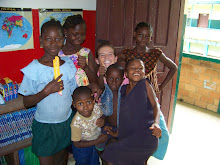I live in a third world country. Liberia is among the poorest nations in the world. I've heard statistics indicating that Liberia has an unemployment rate somewhere around 80 - 85% and estimates that roughly 70% of the population lives on less than $1 a day. In my daily life, I interact with these "dollar a day" people. They are not marked by any obvious physical indicators; most often they are people making an average wage (by Liberian standards - perhaps $60 - $100 per month) who are trying to support so many people - usually children - that their pay ends up needing to stretch farther than it can. They are my students, members of my community, and sometimes my friends. Poverty is a clear reality in Liberia.
Despite the staggering statistics and overwhelming poverty that was impossible to ignore when I first arrived in Liberia, I have found myself growing accustomed to this reality. Although I still notice the tin roofs over dirt floor homes, the children running around in mismatched flip-flops and tattered clothing, and the little boys trying to find a meal from the leftovers at the dining hall each day, I have found that the poverty takes its emotional toll on me less the longer I am here. I want to believe that I'm not becoming hardened to this reality but instead adapting to my present circumstances.
Despite my overall diminished emotional response to the poverty around me, I still have moments when the sobering reality of it catches me off guard. I experienced one of these moments recently when we were in Monrovia at the Sports Commission for one of our basketball games. After our game we were sitting in the bleachers leisurely enjoying watching the boys team play. There are always vendors at the game selling soft drinks and biscuits (cookies/crackers), plantain chips, ice cream, etc. But on this day I really noticed who some of these "vendors" were - children. A little girl and a little boy, neither older than 10 years, working for hours in the oppressive heat selling bags of water for 5LD (LD = Liberian Dollar; 5LD is approximately 15 cents US). The little girl grabbed my attention and I couldn't stop watching her. Her clothes were ill-fitting; a halter top clearly meant for someone twice her age and slippers (flip-flops) worn thin. She worked constantly and quietly. Every now and then I would see her and the little boy stop to sit on the bleachers and watch the game. I could see a certain sadness in their eyes, and I wanted for them the recreation and freedom to play that kids need. I felt so fortunate that the girls at Ricks are able to play basketball - to PLAY. But for these children, their afternoons are not spent on swing-sets or playing hide and seek; their afternoons are spent working, selling bags of waters for pennies to help out their families.
I think this is one of the most striking things about poverty - how it steals away the childhood of so many. It takes away the right kids have to play and forces them into tasks that will enable them to survive - doing anything they can to help their families earn enough money to get survive. One of the first things I heard about Liberia came from my friend, James Blay. As our camp pastor at Passport - Wingate in 2008, he told a story of children who had to sit on the side of the road, breaking apart rocks with small hammers to create materials for building. After hearing this story I remember praying for these children, hearing God call me to be with them, and committing to God and these children that I was coming. I didn't know when or how, but I knew I needed to be in Liberia. Now I'm here, and although the laws, thankfully, have outlawed this particular rock-breaking labor for children, it has not prevented children from engaging in the kinds of labor we would never allow our children to do in the States. Now that I'm here, what am I doing for these children? I felt God calling me to these children, but sitting and watching this little girl at the Sports Commission, I felt helpless. I know I'm teaching at a school, and that is an important step. But what can we, as humans filled with compassion, especially for children, do to help? I challenge you to explore this question with me.
Subscribe to:
Post Comments (Atom)


No comments:
Post a Comment